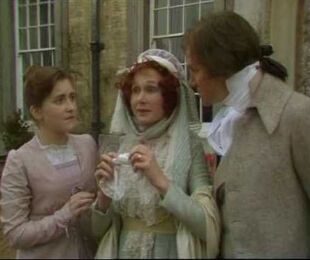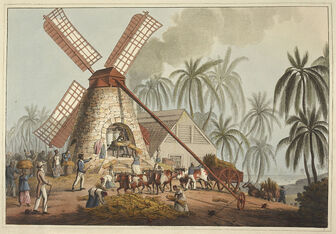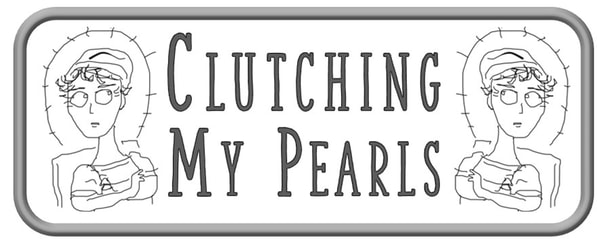 Fanny, Lady Bertram and Edmund bid Sir Thomas farewell on his journey to Antigua, 1983 adaptation
Fanny, Lady Bertram and Edmund bid Sir Thomas farewell on his journey to Antigua, 1983 adaptation It's a conversation between Fanny Price and her cousin Edmund Bertram (whom she secretly loves). They discuss his father, her uncle, Sir Thomas, after his return from a lengthy journey to Antigua.
Fanny tells Edmund "I love to hear my uncle talk of the West Indies. I could listen to him for an hour together." Edmund tells her, "Your uncle thinks you very pretty.” Fanny turns away in embarrassment, and modern readers are cringing as well. Eeuw, an uncle notices that his young niece has filled out nicely while he’s been away and mentions it to his son. Austen makes it clear that Fanny’s discomfort also arises out of hearing Edmund praise her face and figure. “’Oh! don’t talk so, don’t talk so,’ cried Fanny, distressed by more feelings than he was aware of.” ...
“But I do talk to him more than I used. I am sure I do.” [answers Fanny] “Did not you hear me ask him about the slave-trade last night?”
“I did—and was in hopes the question would be followed up by others. It would have pleased your uncle to be inquired of farther.”
“And I longed to do it—but there was such a dead silence! And while my cousins were sitting by without speaking a word, or seeming at all interested in the subject, I did not like—I thought it would appear as if I wanted to set myself off at their expense, by shewing a curiosity and pleasure in his information which he must wish his own daughters to feel.”
This reminds Edmund of something perceptive that Mary Crawford said, and away he goes, talking about Mary Crawford and so much for the slave trade, or any explanation of what Fanny's question was, or what in Sir Thomas’s answer gave Fanny pleasure, or what she longed to ask her uncle as a follow-up question.
 A windmill grinding sugar cane in Antigua
A windmill grinding sugar cane in Antigua Fanny held herself back, although she "longed to" ask more, because no-one else showed “curiosity” or “pleasure” in the “information” which Sir Thomas gave. She did not want anyone to think that she thought herself wiser, or better, or more dutiful, or more interested in social issues, or the family business, than his own daughters.
That short exchange -- that’s it. An opinion about the slave trade is not expressed.
Here it is again, in condensed form:
- Fanny asks a question about the slave trade.
- Sir Thomas answers.
- Dead silence – no-one else in the room said anything.
- Because of her retiring personality and her take on Bertram family dynamics, Fanny doesn't ask any more questions.
However, if you look around the world of literary criticism for commentary on the “dead silence,” you discover many, perhaps the majority, start with the mistaken premise that the “dead silence” refers to an embarrassed silence on the part of Sir Thomas. There are news articles and books and journal articles and textbooks and study guides and podcasts and videos and tweets and theses repeating the error that Fanny’s question was met with dead silence:
Here’s a collection of quotes erroneously claiming that it was Sir Thomas who was silent (it's quite lengthy and I keep adding to it, so you can just scroll down):
|
 Sylvestra Le Touzel as Fanny in the 1983 mini-series, which is true to the book.
Sylvestra Le Touzel as Fanny in the 1983 mini-series, which is true to the book. If I have convinced you that the text says Sir Thomas did answer Fanny, and the "dead silence" refers to his family, I take a leaf from Anne Steele in Sense & Sensibility: "I beg you will contradict it, if you ever hear it talked of" when someone says Fanny Price's question was met with silence.
Some few scholars and critics do understand what is being described in the passage -- they correctly state that Sir Thomas answered Fanny, and then the subject was dropped:
- "When, for instance, Edmund asks her why she did not continue to question her uncle on his West Indian experiences, she explains that she did not like to show more interest in them than Maria and Julia."
- "Finally, it falls to Fanny to question Sir Thomas about the slave trade on his return from Antigua, and though we learn from Edmund that his father is eager to be forthcoming, Fanny herself is silenced by the unresponsiveness of the rest of the family."
- "Fanny explains the silence: Her cousins simply have no interest in their father’s business, and Fanny does not wish to 'set myself off at their expense,' by showing any curiosity about his topics."
- "To our great irritation now, [Fanny] stays silent instead of quizzing Sir Thomas on slavery and thus showing up the indifference of his daughters."
Previous post: How daring was Austen? Next post: Reading into the [dead] silence
| In my Mansfield Trilogy, Fanny Price meets some abolitionists and also hears some of the arguments made by those who defended slavery. We also meet the sailors tasked with suppressing the African slave trade. In this respect, I tried the same technique used by Harriet Beecher Stowe in Uncle Tom's Cabin, putting varying opinions into the mouths of the characters. Click here for more about my books. |

 RSS Feed
RSS Feed